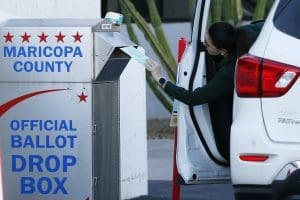Democrats beat 2016 voter turnout numbers despite virus outbreak
Voters in three states bested a number of past records, despite last-minute polling location changes sowing chaos on Election Day.

Democrats in three states held primaries on Tuesday to help determine their 2020 presidential nominee. Despite fear and social distancing efforts to stop the spread of COVID-19, participation in two of those states was actually higher than in 2016.
As of Wednesday morning, 541,378 Democratic ballots had been counted in Arizona. Just 468,461 Democrats voted in the state’s 2016 primary. In Florida, 1,734,701 Democrats participated in Tuesday’s primary, compared to 1,709,183 four years ago.
Only Illinois showed a decline in turnout: With nearly all precincts reporting, 1,540,106 Democrats participated there, down from 2,056,047.
Joe Biden got the largest share of the vote in all three 2020 contests.
Voter turnout was still considerably high, given that the country is largely shut down by the coronavirus pandemic.
The outbreak closed polling locations, caused staffing shortages in many places, and hampered Election Day turnout. Ohio postponed its primary and some other states have announced they will do the same.
But while day-of turnout was down, even Illinois appeared to set a record for largest early voting and vote by mail participation. In fact, 480,523 Arizona Democrats voted before Tuesday — exceeding the entire 2016 primary turnout total.
Given that people are staying home, mail-in ballots may well have saved these primaries. More than 630,000 Florida Democrats voted by mail before Tuesday’s elections.
Experts say this may be the way of the future.
“What the current crisis does is it just sheds a new light on the merits of this system,” Phil Keisling, an advocate for all-mail voting, said in a recent interview. “And at a minimum, it might be a strategy by which states can navigate through this unprecedented moment.”
Still, not all states have robust vote by mail programs under their current law and some would need to act quickly to implement it for this year’s elections.
“The reality is every level of government is going to have to cope with the fallout if this virus continues to spread,” Sen. Ron Wyden (D-OR) told Politico. “Setting up emergency systems for voting won’t be easy, but the alternative is forcing vulnerable Americans to choose between casting a ballot and protecting their health.”
Published with permission of The American Independent Foundation.
Recommended

New NC GOP chair flirts with bogus stolen election conspiracies
Simmons predecessor was a staunch 2020 election denier
By Jesse Valentine - April 19, 2024
Texas activists pushed abortion restrictions in NM cities and counties, records show
Emails reveal influence and control in exchange for promises of legal help
By Austin Fisher, Source NM - March 04, 2024
Cannabis workers across Missouri begin push to unionize dispensaries
The first day was a breeze. Sean Shannon and Danny Foster walked into several marijuana dispensaries around Missouri with their matching “Union For Cannabis Workers” shirts and talked to employees about the possibility of unionizing. “The first day, there were 57 stops amongst the teams,” said Shannon, lead organizer with UFCW Local 655, which actually […]
By Rebecca Rivas - December 04, 2023










































































